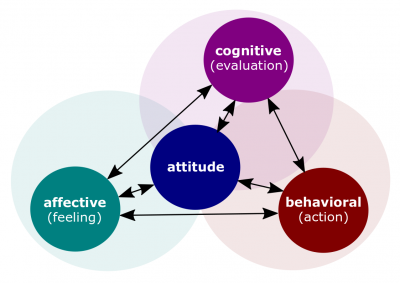Difference between revisions of "Attitude"
(Created page with "400px|thumb|right|[[Attitude]]Attitude is an evaluative statement or judgment, either favorable or unfavorable, concerning objects, people, or events...") |
|||
| Line 1: | Line 1: | ||
[[File:Attitude.png|400px|thumb|right|[[Attitude]]]][[Attitude]] is an evaluative statement or judgment, either favorable or unfavorable, concerning objects, people, or events. | [[File:Attitude.png|400px|thumb|right|[[Attitude]]]][[Attitude]] is an evaluative statement or judgment, either favorable or unfavorable, concerning objects, people, or events. | ||
| + | |||
| + | ==Definitions== | ||
| + | According to [[Organizational Behavior by Robbins and Judge (17th edition)]], | ||
| + | :[[Attitude]]. An evaluative statement or judgment concerning objects, people, or events. | ||
==Components== | ==Components== | ||
Revision as of 04:59, 26 November 2018
Attitude is an evaluative statement or judgment, either favorable or unfavorable, concerning objects, people, or events.
Definitions
According to Organizational Behavior by Robbins and Judge (17th edition),
- Attitude. An evaluative statement or judgment concerning objects, people, or events.
Components
- Cognitive component. That part of an attitude that's made up of the beliefs, opinions, knowledge, or information held by a person. In other words, the cognitive component is the opinion or belief segment of an attitude.
- Affective component. The emotional or feeling segment of an attitude.
- Behavioral component. The segment of an attitude that refers to an intention to behave in a certain way toward someone or something.
